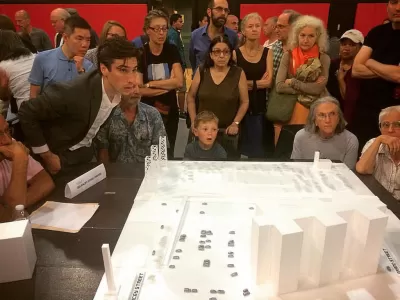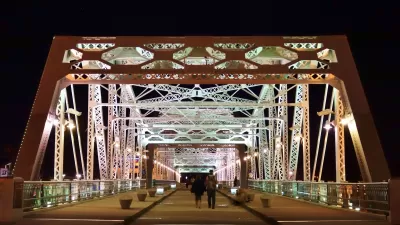The methodology calls for authentic participation and a willingness to engage stakeholders in a "collaborative and empathic" placemaking process.

Steven Bingler, founder and president of planning and design practice Concordia, outlines his organization's principles for what he calls Community CoDesign, a set of values aimed at developing a "collaborative and empathic approach to placemaking to address the growing complexities of climate change, public health, endemic poverty, social inequities and other challenges of the 21st century."
"In the design arts, one significant example of community codesign emerged during the Great Depression through the WPA’s Federal Art Project, when teams of planners, designers, artists, and artisans came together to craft a whole-community art form, expressed through the design of public spaces, architecture, sculpture, murals, set design, theatrical performance, music, and dance. Multidisciplinary collaborations became a tool for rallying pride, creating employment, illuminating common necessities, arousing an awareness of the suffering of people, and drawing attention to the need for the conservation of natural resources."
The Depression-era programs had a profound impact on American design well after they ended, with many of the projects enduring as popular attractions and points of civic pride today. Bingler claims that a similar approach can help planners and designers create more inclusive design processes to address today's urgent issues, including climate change and sea level rise. As a New Orleans-based firm, Concordia and its staff have first-hand experience with the devastating effects of coastal flooding and displacement. Concordia's methodology, Bingler writes, is grounded in six core values: honest engagement, authentic stakeholder participation, drawing from local talent and leadership, an "all-one" strategy, willingness to let go when the need arises, and commitment to the common good.
The challenges of urbanization and climate change, he argues, can only be faced through a shared vision. "The fate of future generations will be determined by the swift, smart and compassionate actions of today’s planning and design professionals, working hand and heart with the public they are here to serve."
FULL STORY: The Principles of Community CoDesign

Planetizen Federal Action Tracker
A weekly monitor of how Trump’s orders and actions are impacting planners and planning in America.

Maui's Vacation Rental Debate Turns Ugly
Verbal attacks, misinformation campaigns and fistfights plague a high-stakes debate to convert thousands of vacation rentals into long-term housing.

Restaurant Patios Were a Pandemic Win — Why Were They so Hard to Keep?
Social distancing requirements and changes in travel patterns prompted cities to pilot new uses for street and sidewalk space. Then it got complicated.

In California Battle of Housing vs. Environment, Housing Just Won
A new state law significantly limits the power of CEQA, an environmental review law that served as a powerful tool for blocking new development.

Boulder Eliminates Parking Minimums Citywide
Officials estimate the cost of building a single underground parking space at up to $100,000.

Orange County, Florida Adopts Largest US “Sprawl Repair” Code
The ‘Orange Code’ seeks to rectify decades of sprawl-inducing, car-oriented development.
Urban Design for Planners 1: Software Tools
This six-course series explores essential urban design concepts using open source software and equips planners with the tools they need to participate fully in the urban design process.
Planning for Universal Design
Learn the tools for implementing Universal Design in planning regulations.
Heyer Gruel & Associates PA
JM Goldson LLC
Custer County Colorado
City of Camden Redevelopment Agency
City of Astoria
Transportation Research & Education Center (TREC) at Portland State University
Jefferson Parish Government
Camden Redevelopment Agency
City of Claremont





























